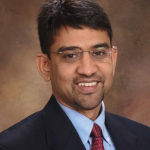If you really believe that your idea might become very valuable to society and make medical care better, then every time is a good time to do it —Subinoy Das, MD
Explore This Issue
December 2019
ENTtoday: How do you balance your entrepreneurship and academic medicine life?
PB: The partners you have in any venture are critical. Before I landed on these two start-ups, for example, I looked into other things. And some proved impossible …. If you don’t have a business partner who is a great fit, who is capable of moving the project forward independently—for me, this is just my experience—it would be impossible because I have not quit my day job. So that’s unbelievably important.
The other thing, to be able to contribute my fair share, I think there’s a lot of management stuff out there that’s helpful. I like David Allen’s [book] Getting Things Done (Viking, 2001), and the whole idea of chunking your time. You really have to exert discipline on your calendar, especially if you’re a busy clinical person, and block out time every single week in which you are completely free and devoted to your projects.
Leap of Courage
 Subinoy Das, MD, chief medical officer with Tivic Health, first ventured into entrepreneurship as a consultant with Medtronic shortly after he finished fellowship. There, he worked on a biomaterial to be used as a sinus sealant. With an NIH grant at Ohio State University, he conducted research that became the groundwork for Sinu-Test, a test still in clinical testing that includes an optical reader and is designed to tell whether a sinus infection is viral or bacterial. He also works with the company VedaJag, which developed AGADA, a wound-healing product made of chitosan—a biomaterial made of insects’ and crustaceans’ exoskeletons that prevents bleeding and is highly anti-microbial. Tivic markets a microcurrent device for treating sinus and headache pain. Dr. Das also works with a company, along with two pediatric surgeons, on a disposable silicone mouth guard designed to reduce injury during tonsillectomy procedures.
Subinoy Das, MD, chief medical officer with Tivic Health, first ventured into entrepreneurship as a consultant with Medtronic shortly after he finished fellowship. There, he worked on a biomaterial to be used as a sinus sealant. With an NIH grant at Ohio State University, he conducted research that became the groundwork for Sinu-Test, a test still in clinical testing that includes an optical reader and is designed to tell whether a sinus infection is viral or bacterial. He also works with the company VedaJag, which developed AGADA, a wound-healing product made of chitosan—a biomaterial made of insects’ and crustaceans’ exoskeletons that prevents bleeding and is highly anti-microbial. Tivic markets a microcurrent device for treating sinus and headache pain. Dr. Das also works with a company, along with two pediatric surgeons, on a disposable silicone mouth guard designed to reduce injury during tonsillectomy procedures.
ENTtoday: How do you know when an idea or a scientific finding is worth taking a shot at commercially?
Dr. Das: It really requires a leap of courage and a lot of passion that your idea is going to be helpful and valuable to society. You, by doing so, are taking tremendous risk and are going to be forgoing a lot of income for many, many years. It can’t be done as a financial decision because it doesn’t make sense from a risk perspective to do this for any financial reason. But, if you really believe that your idea might become very valuable to society and make medical care better, then every time is a good time to do it. And then you can work it around where you can find ways to support yourself financially while you work on this idea.
ENTtoday: How did you decide to leave academic medicine?
SD: It was a very difficult decision. It was coming at a time when I would be forgoing a significant amount of income, and what was helpful was that it occurred five to six years after I had left medical school. So, in some ways I was very concerned that I had paid off all of my medical school debt and I had paid off my house. My wife is a physician also, and we had paid off enough debt where my family—my two children at the time and my wife—could survive even if I was not making any income. That was a difficult choice, but I thought I would be much happier in trying to develop a medical device that could treat maybe millions of people as opposed to just solely working one patient at a time.
ENTtoday: You’ve said that in business ventures it’s easy to create a win–lose relationship, but the challenge is creating a win–win. How do you create this dynamic?
SD: There are a lot of situations where you can, for example, bill for your time in kind of a monopoly type of setting where either your patients or your business partners are forced to utilize you as a resource in a way that is very expensive to the patient and where you have asymmetric knowledge and you realize the value of what they’re paying for is not the value of what they’re getting. I would say that’s a win–lose situation.
Then there are lose–win situations where companies are exploiting you for your knowledge by asking you for your intellectual property—for free, basically. There are also lose–lose situations where you and business partners fight over equity or resources or who gets credit for a paper or who’s going to be right or wrong, and the two of you can’t come to an agreement, and as a result the relationship is destroyed.